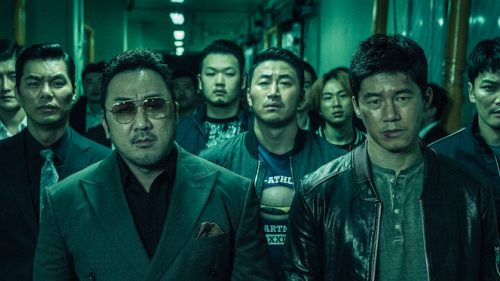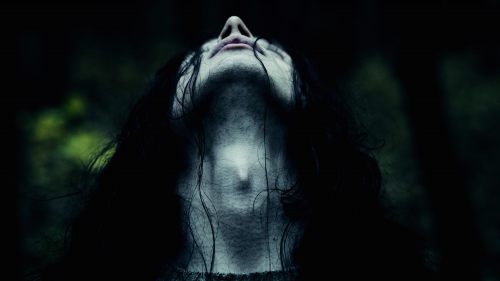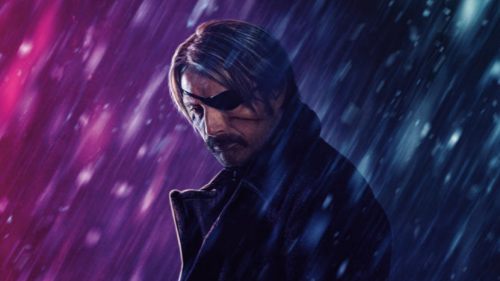Fantasia 2018: LORDS OF CHAOS Tells A Disturbing, Hilarious Tale Of Black Metal Radicalization
Lords of Chaos opens with a title card claiming the film is “based on truth and lies.” Partly a nod to its controversial source book, partly a warning of the outrageous events to follow, it’s the perfect introduction to Jonas Åkerlund’s provocative and brilliant new film. The story of Øystein “Euronymous” Aarseth and the rise of “true Norwegian black metal” is as unbelievable as it is true.
Taking place between 1988 and 1993, Lords of Chaos’ story is one of energy, heartbreak, hilarity, and terror. Narrated by Euronymous (Rory Culkin, exhibiting a sublime blend of wit, misanthropy, and concealed emotion), it charts the rise of his band Mayhem, record shop Helvete, and record label Deathlike Silence. Shooting with a dispassionate eye and handheld camerawork, Åkerlund tells a story within an extreme musical movement that should shock, appal, and provoke thought in its audience.
It should come as little surprise that a film about the Wild West of black metal is filled with confrontational imagery. Confrontation was and continues to be a core value of the genre. But it's not the (well-acknowledged and affectionately pilloried) silliness of corpse-paint, Satanic imagery, and armoured costumes that's shocking; nor the lyrics and promo rhetoric about evil and depression and death. It's the film's frank, unblinking depiction of actual evil, depression and death - starting with the grisly suicide of Mayhem singer Dead (Jack Kilmer). Known for self-harming onstage and killing cats in private, Dead comes to a sadly foreseeable end when he slits his wrists and throat and shoots himself, all depicted with procedural grimness. Discovering the stomach-turning scene, Euronymous seizes the opportunity for morbid publicity, rocketing his career upwards off the back of his friend's suicide, even as guilt eats away at him. From Dead's corpse, true Norwegian black metal is born.
But Lords of Chaos is not so much a film about a musical scene as it is a film about a relationship - the tragic and utterly fascinating relationship between Euronymous and his protege Varg Vikernes (a terrifyingly focused Emory Cohen).
One of the central conflicts throughout the film is that of true believers versus posers. Black metal is so theatrical that the line between performance and real life can seem blurred, and the line between authentic and fake even more so. What defines the scene - is it the music, or the lifestyle and belief system that springs up around it? Who's the greater poser - the Johnny-come-lately fan who throws themselves into that belief system, or the founder who sees controversy merely as a marketing tool? Is black metal a philosophical cause or just a musical act?
Vikernes is emblematic of this conflict. First seen being spurned, comically, by his Mayhem idols for wearing a Scorpions patch on his jacket, he quickly reinvents himself as the ultimate black metal stan - dying his hair, buying new clothes, changing his name to Varg, and compensating for his inexperience by adopting an extremist attitude towards black metal. Euronymous is unimpressed by this fucking poser - but he can't help but be intrigued by his commitment.
What starts as an attempt to ingratiate turns into a vicious rivalry of escalation. Varg takes Euronymous’ troll-like rhetoric to heart and puts it into action, through a spate of church-burnings around Norway. Euronymous uses Varg's actions to promote albums - which in turn sparks more arson. Another band member takes things even further, stabbing a gay man to death in a park. As Varg's activities veer from burning churches to planning terrorist bombings, Euronymous goes on a path of maturation: reflecting on Dead's suicide, becoming nervous about his out-of-control band members, and finally admitting to himself that “all this evil and darkness was supposed to be fun.” And when the arc inevitably comes crashing down, with a paranoid Varg murdering the reformed Euronymous by stabbing him 23 times (each stab thudding home, crucially, onscreen), the pattern becomes crushingly familiar.
Lords of Chaos’ radicalisation narrative can be seen the world over - and not just in fans attacking or killing their heroes. God knows how many internet trolls have found themselves in Euronymous’ position, egging on violent rhetoric "for lols" before suddenly being confronted with the real-world consequences of their words. Similarly, we see Vargs in the media on a regular basis, turning edgelord philosophies into real-world violence. Lords of Chaos is sure to inspire arguments of depiction versus endorsement, particularly in the first half of the film where self-harm is venerated by the comparatively immature characters. On the other hand, the film thankfully lacks the book's uneditorialised musings on right-wing Nordic politics, instead openly mocking Varg's haphazard conflation of Nazi, Norse, and Satanic imagery, depicting him as a pitiful loser lashing out at a world he perceives to be against him.
One wonders, however, whether Lords of Chaos - with its oh-so-metal images of church burnings, stabbings, and (faked) animal cruelty - could become a sort of modern Fight Club (i.e. read as promoting what it's satirising) for fans who might miss the film's (fairly clear) commentary. Certainly, the handful of Fantasia audience members cheering at Euronymous' brutal stabbing and throwing horns at murdered cats suggest such a misreading is possible. The fact that, after his incarceration, Varg went on to be convicted of inciting racial hatred, suggests that such a misreading is dangerous.
I don’t know how much of the history depicted in Lords of Chaos transpired as presented. Most of the events are well-corroborated by facts, though the film does engage in considerable conjecture about characters’ inner thoughts and feelings, which we'll never fully know. Varg and his followers in particular contest the central claim that he murdered Euronymous in cold blood...although stabbing someone 23 times doesn't exactly smack of self-defense.
But in a way, the film’s historical accuracy doesn’t matter. As a work of cinema, Lords of Chaos tells a compelling story that would play out the same in nearly any “scene." It's a powerful narrative about radicalisation, and a haunting, heavy, surprisingly hilarious chronicle of a weird and wild musical subculture. I can't stop thinking about it, and I'm desperate to see it again. Sadly, though, the cut that played at Sundance and Fantasia will never play again.
Clearly, some things are just too metal.



